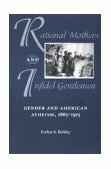Calling themselves “Freethinkers,” self-proclaimed liberals organized across the United States after the Civil War to oppose endorsement of Christianity as the national religion. Heralding a trinity of science, rationalism, and progress, these atheists and agnostics advocated the complete separation of church and state. They were self-conscious prototypes of the modern, secular American and counted among their numbers Robert G. Ingersoll, Francis E. Abbott, Moses Harman, Matilda Joslyn Gage, and Elizabeth Cady Stanton.
In Rational Mothers and Infidel Gentlemen, Evelyn Kirkley shows that, despite the fact that several prominent women’s righs workers were also Freethinkers, the Freethough movement was ambivalent about gender. Their understanding of gender was complex, ranging from biological determinism to historic constructionism. Kirkley writes that “Freethinkers” accepted, rejected, and synthesized late Victorian gender norms, at once struggling to achieve social and political respect and remain faithful to their principles. Most intriguing, she concludes, is their debate over man- and womanhood, which was a precursor to the late-twentieth-century gender controversy in the academy, another institution prizing science, rationalism, and progress.


